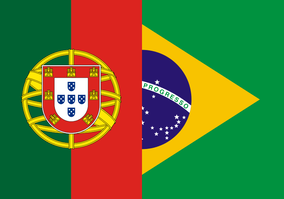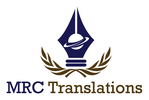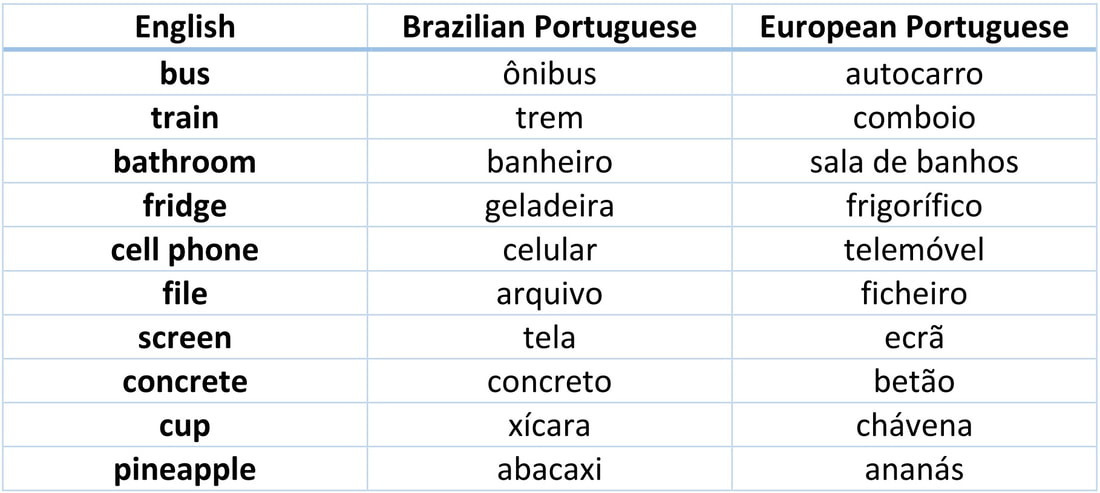 So your company has decided to expand its business and include Portuguese—the sixth most widely spoken language in the world—in its marketing strategy. Now you may find yourself asking questions like:
I often see translation jobs from English to Portuguese that don’t mention which variant is expected. However, the choice between Brazilian Portuguese and European Portuguese has strategic implications. Even though Portuguese is officially a single language, Brazilian Portuguese and European Portuguese undeniably differ in important ways. What are the main differences between Brazilian Portuguese and European Portuguese? Perhaps the most obvious difference is in pronunciation. The accent difference is so striking that Brazilians often have a hard time understanding Portuguese people, to the point that it isn’t unusual to see subtitles in Brazilian TV shows or news broadcasts when Portuguese people are speaking. On the other hand, since Brazilians speak slower and Portuguese people are often exposed to Brazilian Portuguese through soap operas, movies, and other media, people in Portugal can understand Brazilian Portuguese more easily. Nevertheless, the differences go beyond pronunciation. There are some grammatical differences, such as the use of the pronouns “você” and “tu”, which correspond to the 2nd person singular “you”. While “tu” is preferred in Portugal, “você” is more common in Brazil. In addition, in Portugal, “você” is considered more formal, whereas in Brazil it is very informal. More importantly, there are also relevant lexical differences. Many common words used in Brazil aren't used in Portugal and vice-versa. There are more differences between Brazilian Portuguese and European Portuguese than between US English and UK English, for example. Here are just a few examples. Many of these differences exist because Brazilian Portuguese absorbed words from indigenous and African languages.
Some words also exist in both variants but have entirely different meanings. For example, “apelido” means nickname in Brazil and surname in Portugal. Are Brazilian Portuguese and European Portuguese mutually understandable? As a result of the differences mentioned, when a speaker of one variant reads a document in the other variant, most of the text will be understandable, but it will sound strange or unnatural. In some cases, those differences can lead to a communication breakdown. Therefore, they should be treated as separate languages for localization purposes. Another caveat is that you should be wary of translators who claim they can translate into both variants. This sometimes happens when a Brazilian translator has lived in Portugal or when a Portuguese translator has lived in Brazil for some time. In those situations, the speaker tends to underestimate the influence of the local language , and they often fail to realize that fragments of one variant are creeping into the other. In other words, their original variant is being “contaminated” with the other, and the result is often a mix of both—which won’t please either side. Is there such a thing as “international Portuguese” or “universal Portuguese”? No, there isn’t. Despite efforts to keep Portuguese a single language, like the Orthographic Agreement of 1990 between Brazil, Portugal and the other Portuguese-speaking countries, the fact is that the difference between European Portuguese and Brazilian Portuguese is growing over time. Considering the geographical separation and cultural differences between both countries, this process is actually unavoidable from a linguistic point of view. Should I localize into Brazilian Portuguese, European Portuguese, or both? Since you won’t be able to please speakers of both countries with a single version of your material, you do have to make a choice. In terms of reach, the difference is huge: Brazil has approximately 210 million inhabitants, while the population of Portugal is just over 10 million. Therefore, if your goal is to get the best return on your investment, Brazilian Portuguese is the most logical choice. If your target audience comprises mostly people in Europe and Africa, European Portuguese is the best choice. However, if you intend to reach both audiences, ideally you should localize into both variants. Whatever you do, don’t mix both variants. That is a sure way to displease both sides.
0 Comments
|
Details
Matheus R. ChaudI am a Certified English to Portuguese Translator with extensive experience in translation, proofreading, editing, subtitling, and quality assurance. Archives
March 2024
Categories |


 RSS Feed
RSS Feed



